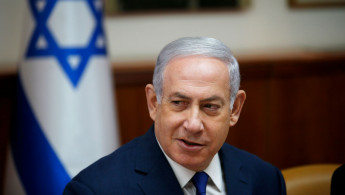Netanyahu meets King Abdullah in Jordan for rare talks
Netanyahu met with King Abdullah to discuss regional developments as well as "advancing the peace process and bilateral relations."
2 min read
Monday's visit was Netanyahu's first to Jordan since 2014. (AFP)
Israeli Prime Minister Benjamin Netanyahu and Jordan's King Abdullah II held rare talks in Jordan on Monday focused on the stalled Israeli-Palestinian peace process and on the Jerusalem issue.
Jordan and Egypt are the only Arab countries to have peace treaties with Israel, and Monday's visit was Netanyahu's first to the kingdom since 2014.
The king stressed "the need to advance in the efforts to find a settlement to the Israeli-Palestinian conflict on the basis of a two-state solution", the Jordanian royal court said, referring to the creation of a Palestinian state.
"The only way to achieve peace and stability in the region" is a solution to "allow the creation of a Palestinian state on the lines of June 1967 with east Jerusalem as the capital, which would live in peace and security alongside Israel," he was quoted as saying.
King Abdullah said the question of Jerusalem - one of the thorniest issues of the Israeli-Palestinian conflict - was "the key to achieving peace".
The Palestinians want east Jerusalem as the capital of their future state, but Israel considers the entire city to be its eternal and indivisible capital.
"The king and the prime minister discussed regional developments as well as advancing the peace process and bilateral relations," the Israeli leader's spokesman Ofir Gendelman tweeted.
"Prime Minister Netanyahu reiterated Israel's commitment to maintaining the status quo at the holy sites in Jerusalem," he added.
Under the status quo agreement, only Muslims are allowed to pray at the Al-Aqsa/Temple Mount site, while Jews may visit but not pray - instead worshipping at the Western Wall.
Israel and Jordan signed a treaty ending 46 years of aggression in 1994 that recognises the kingdom's "historic role" in the management of holy Muslim sites in Jerusalem.
Israel appointed a new ambassador to Amman in February as ties between the two sides normalised after the killing of two Jordanians by a security guard for the Israeli embassy in July last year.
In January, the Jewish state apologised and offered compensation for the two deaths along with that of a Jordanian judge killed by an Israeli soldier at the border between the two countries in 2014.
Jordan and Egypt are the only Arab countries to have peace treaties with Israel, and Monday's visit was Netanyahu's first to the kingdom since 2014.
The king stressed "the need to advance in the efforts to find a settlement to the Israeli-Palestinian conflict on the basis of a two-state solution", the Jordanian royal court said, referring to the creation of a Palestinian state.
"The only way to achieve peace and stability in the region" is a solution to "allow the creation of a Palestinian state on the lines of June 1967 with east Jerusalem as the capital, which would live in peace and security alongside Israel," he was quoted as saying.
King Abdullah said the question of Jerusalem - one of the thorniest issues of the Israeli-Palestinian conflict - was "the key to achieving peace".
The Palestinians want east Jerusalem as the capital of their future state, but Israel considers the entire city to be its eternal and indivisible capital.
"The king and the prime minister discussed regional developments as well as advancing the peace process and bilateral relations," the Israeli leader's spokesman Ofir Gendelman tweeted.
"Prime Minister Netanyahu reiterated Israel's commitment to maintaining the status quo at the holy sites in Jerusalem," he added.
Under the status quo agreement, only Muslims are allowed to pray at the Al-Aqsa/Temple Mount site, while Jews may visit but not pray - instead worshipping at the Western Wall.
Israel and Jordan signed a treaty ending 46 years of aggression in 1994 that recognises the kingdom's "historic role" in the management of holy Muslim sites in Jerusalem.
Israel appointed a new ambassador to Amman in February as ties between the two sides normalised after the killing of two Jordanians by a security guard for the Israeli embassy in July last year.
In January, the Jewish state apologised and offered compensation for the two deaths along with that of a Jordanian judge killed by an Israeli soldier at the border between the two countries in 2014.





 Follow the Middle East's top stories in English at The New Arab on Google News
Follow the Middle East's top stories in English at The New Arab on Google News
![Israeli forces ordered bombed Gaza's Jabalia, ordering residents to leave [Getty]](/sites/default/files/styles/image_330x185/public/2176418030.jpeg?h=a5f2f23a&itok=_YGZaP1z)

